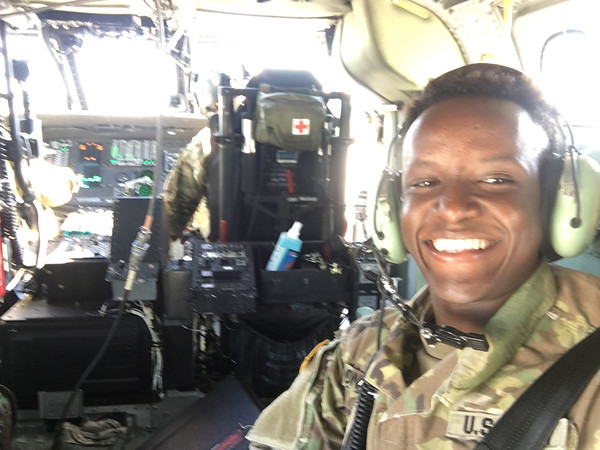George Ongoro has had more than a lifetime’s worth of experiences for only being 23 years old.

Born in Mogadishu, Somalia, Ongoro and his family had to flee their home when he was a child — and had to leave his father behind.
“Life was hard over there,” he said, with not enough food, water or medical care to go around.
The family went to northern Kenya, where they stayed in a refugee camp for about a year and a half. While in the camp, Ongoro’s younger twin brothers both came down with cholera. He said there was only one doctor in the camp, and not nearly enough medicine or medical care in general. It was then that Ongoro decided to dedicate his life to helping others, and he wanted to do that through pursuing medicine.
“What really sparked my passion for going into the medical field was when my two brothers got sick. Other people in my community were getting sick, and there wasn’t anywhere they could go for proper care. It made me want to heal people,” he said. “I wanted to be the one to heal my brothers because I could see how much they were suffering at the time.”
His brothers recovered, and by the time Ongoro was 8 the family had the opportunity to come to the U.S. as refugees. They would eventually settle in St. Paul.
“Life was hard over here because of the language barrier. And also because my parents have not gone to school,” he said. “I had to really step up.”
Ongoro would be the one to make sure his family was going to doctor appointments and would translate his siblings’ school forms for for his parents.
At the age of 17, Ongoro joined the U.S. Army.
“I wanted to serve others,” he said.
As he was a minor, he had to have his mother’s permission — something that was a tough sell at the time.
“In America, the military is this group that’s respected — that’s there for their people, that would give anything for their country and respects other people,” Ongoro said. “But, in my country, it’s the complete opposite. The military abuses people. … They’re not really there for the people.”
Through talking about the differences with his mother and introducing her to a friend of his in the service, she eventually understood and allowed Ongoro to enlist. He joined the Army as a medic, and said his goal was to help people in medically disadvantaged communities through his service.
In the years since, his family has come around to the idea of both his military as well as his medical service.
“They support me in any way that they can by motivating me, telling me that I can do anything that I want in this country,” Ongoro said. “I have an opportunity to be whoever I want.”
It was during his military service that Ongoro would decide to start pursuing an education in the medical field, eventually enrolling at St. Cloud State University. He said his commander has been good about working with him on balancing both school and service, but with the understanding that if Ongoro was called up, the Army would have to take precedence.
There were times Ongoro had to complete his courses online, like when he was deployed on joint missions to Bulgaria and Lithuania in different years. Then in 2020 when the COVID-19 pandemic hit, he was once again deployed to other parts of the region and the country to help — supplying masks and distributing vaccines in different locations.
Ongoro also spent time at Walter Reed National Military Medical Center to work on a team studying post traumatic stress disorder. The team was looking at identifying different biotypes or variants of PTSD in the hopes of being able to diagnose and treat the disorder more effectively.
“You see a lot of soldiers who have given up a lot for their country and for their families as well. And sometimes when they come back to the U.S., they’re misdiagnosed or they’re not treated properly because PTSD has a lot of variants,” Ongoro said. “It’s not the same for everyone. So treating it comes with difficulty as well.”
In spring 2021, Ongoro graduated with a degree in biomedical sciences with a minor in military sciences. He is now juggling the Army as well as applying and interviewing for medical school. In August Ongoro found out he was one of the two inaugural recipients of the Dr. Carrie Holmes MCAT Grant — a grant created in memory of Holmes, who passed away in 2020 while working as a physician in the St. Cloud State Medical Clinic. Ongoro said he was “very honored” to be selected for the grant.
“The path to medical school is hard, and to be honest, it’s expensive as well. Hearing I was awarded this, I’m just grateful for someone being so caring to support my path to medicine,” he said. “It just makes it more worth it that, in the future, as I continue my path to medicine, I’ll be helping others. I will not only be helping patients, but I will also be able to pay it forward to others who are interested in medicine.”
See this and other stories in the 2020-21 St. Cloud State University Philanthropic Impact Report
